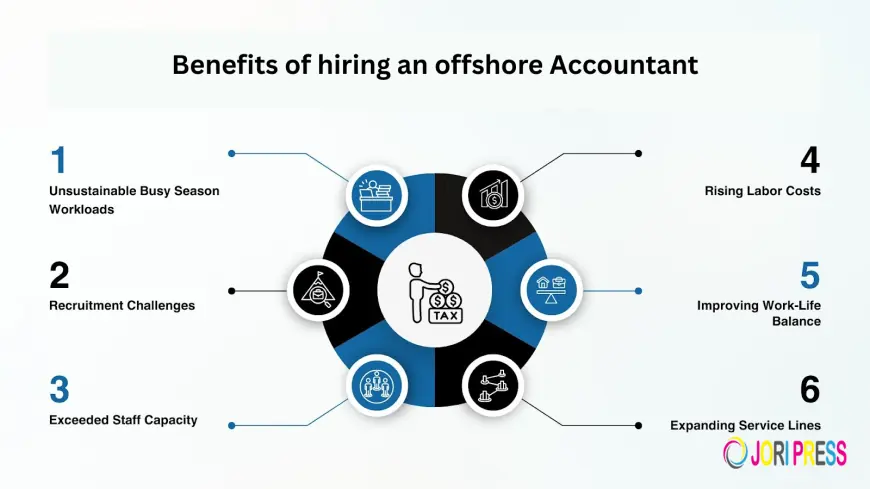Is Hiring Offshore Accountants the Smartest Way to Cut Costs in 2025?
Hiring offshore accountants helps businesses cut costs, access skilled talent, and boost efficiency without compromising quality. Choose partners who ensure data security, comply with global standards, and communicate transparently. With the right offshore accounting team, you can streamline bookkeeping, tax, and payroll processes while focusing on growth, accuracy, and long-term financial success.

In today’s fast-changing financial world, many businesses are exploring ways to reduce costs, improve efficiency, and access skilled professionals — and one of the most effective methods is to hire offshore accountants.
But before you take that step, it’s important to understand what offshore accounting really means, how it works, and what to consider before hiring.
Let’s walk through everything you should know before you make the decision.
What Does It Mean to Hire Offshore Accountants?
When you hire offshore accountants, you’re partnering with professionals located outside your country — often in countries like India, the Philippines, or Eastern Europe — who handle accounting, bookkeeping, payroll, or tax support remotely.
Offshore accounting isn’t just about saving money. It’s about scalability, flexibility, and access to global expertise without the high overhead costs of local hiring.
In short: Offshore staffing allows businesses to operate smarter, not harder.
Why Are Businesses Choosing Offshore Accounting?
You might be wondering — why are so many accounting firms and small businesses outsourcing their financial work overseas?
Here are a few reasons why offshore hiring is on the rise:
• Cost Efficiency: You can save up to 60–70% in labor costs.
• 24/7 Productivity: Different time zones mean work continues even after your office closes.
• Skilled Workforce: Offshore accountants are trained in U.S., U.K., and Australian accounting standards.
• Scalable Teams: Quickly add or reduce team members based on seasonal or project-based demands.
• Focus on Growth: With routine tasks handled offshore, your local team can focus on strategy and client relations.
These benefits make offshore accounting an attractive choice — but only if you do it the right way.
Key Things to Know Before You Hire an Offshore Accountant
Before you rush to sign a contract, take a step back. The success of offshore accounting depends on preparation and understanding. Here’s what you should keep in mind:
1. Data Security and Compliance Are Non-Negotiable
When outsourcing financial operations, data protection should be your top priority.
Check if your offshore partner complies with global security standards such as:
• GDPR (for European data)
• SOC 2 Type II
• ISO 27001 certification
Ask: How do they handle confidential client data? What security infrastructure do they use?
2. Communication Builds Trust
Working with a team overseas means you’ll rely heavily on digital communication. Ensure the partner provides:
• Dedicated account managers
• Regular status updates
• Overlapping working hours
• Clear channels (Zoom, Slack, or Teams)
• Good communication eliminates confusion and builds long-term collaboration.
3. Understand the Legal and Tax Implications
Depending on your country, there may be tax reporting or compliance requirements when hiring offshore staff.
Consult your CPA or legal advisor to understand how to properly structure contracts and payments for offshore workers.
4. Evaluate Their Expertise and Tools
A good offshore accounting firm uses modern accounting tools like QuickBooks, Xero, NetSuite, or Sage.
Also, check whether they’re familiar with GAAP or IFRS standards, depending on your region.
This ensures accuracy and smooth integration with your local operations.
5. Start Small, Then Scale
Before transferring your entire accounting process offshore, test the waters with a pilot project or a small team.
This allows you to evaluate performance, communication, and efficiency before scaling up.
Common Questions Before Hiring Offshore Accountants ?
Is it safe to hire offshore accountants?
Yes — as long as you choose a trusted and compliant provider. Reputable offshore firms follow strict data privacy laws and use advanced cybersecurity systems.
How do offshore accountants handle time zone differences?
Most offshore teams adjust their working hours to match your time zone partially, ensuring real-time communication and faster turnaround.
Will offshore accountants understand local accounting rules?
Top offshore accountants are trained in U.S. GAAP, IFRS, and country-specific tax systems, ensuring compliance and accuracy.
Can small businesses also hire offshore accountants?
Absolutely. Offshore accounting is not limited to large firms — startups and small businesses can gain huge benefits in cost savings and efficiency.
How to Choose the Right Offshore Accounting Partner?
Selecting the right offshore partner is crucial. Here’s a checklist to guide your decision:
1.Proven track record with international clients
2.Transparent pricing model
3.Strong data security infrastructure
4.Client references or case studies
5.Trained accountants familiar with your region’s regulations
Don’t just hire — partner with a team that aligns with your business goals and values.
Final Thoughts: Make Offshore Accounting Work for You:
Hiring offshore accountants can be a game-changer for your business — but only if done strategically.
Take time to assess your needs, vet your partners carefully, and ensure data security and communication are top priorities.
When you hire offshore accountants the right way, you’re not just outsourcing tasks — you’re building a global financial team that supports your growth, efficiency, and success.
What's Your Reaction?
 Like
0
Like
0
 Dislike
0
Dislike
0
 Love
0
Love
0
 Funny
0
Funny
0
 Angry
0
Angry
0
 Sad
0
Sad
0
 Wow
0
Wow
0
















































